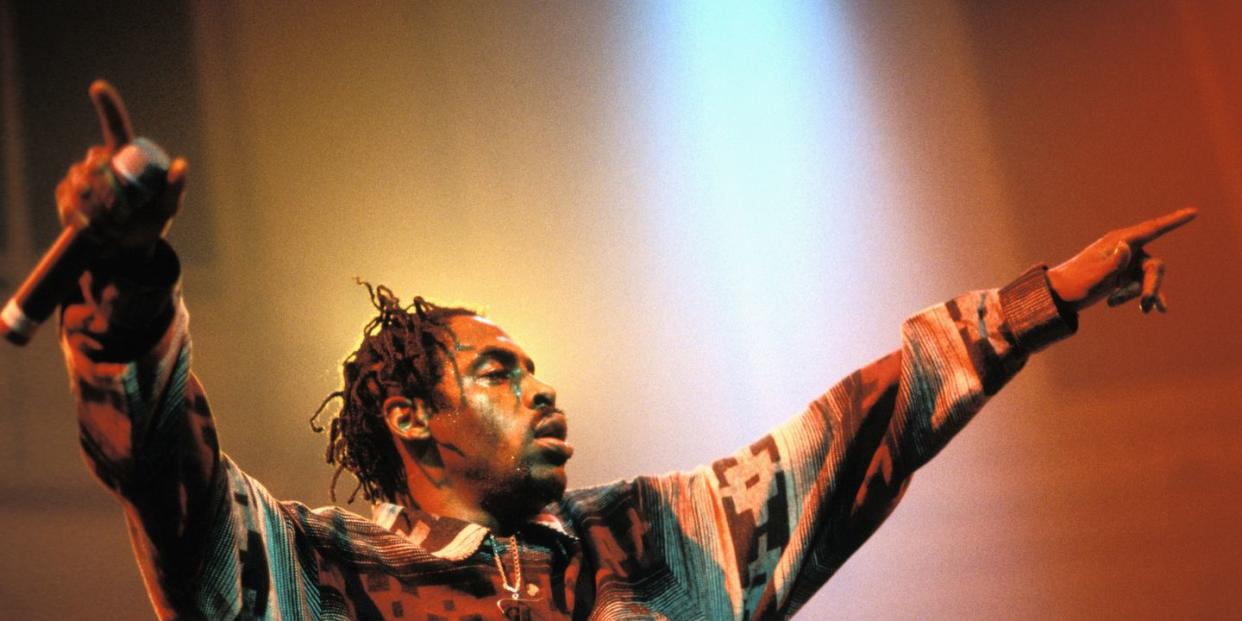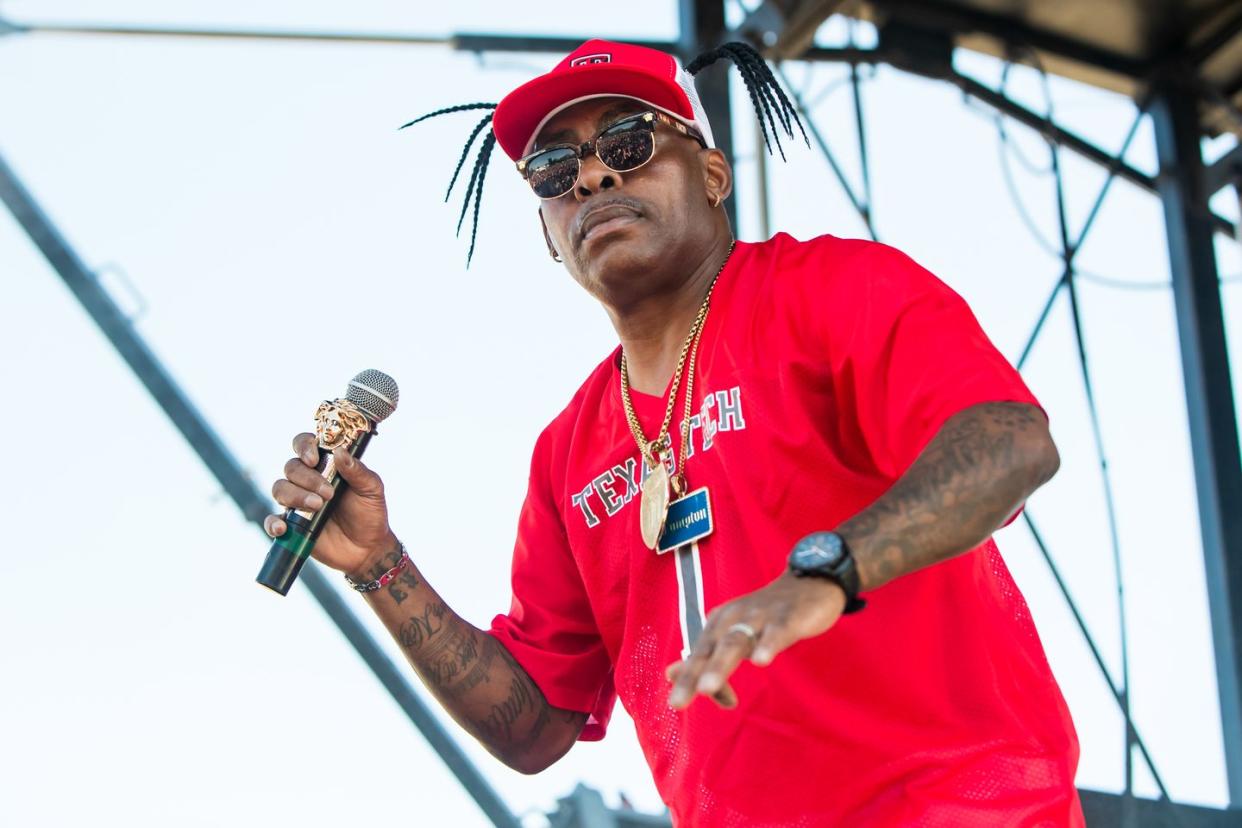Coolio Was Always—And Only—Himself

We heard about Coolio’s ability to drop game before most of us even knew who he was. When Coolio was still on the come up, he left some jewels with Snoop Dogg about how to navigate the music industry when he got his first record deal. So the undisputed King of Rap in the '90s name-checked him on one greatest albums to ever impact the culture.
"It’s like everywhere I look and everywhere I go/I'm hearing motherfuckers trying to steal my flow," Snoop Dogg rapped on Doggystyle’s "Doggy Dogg World" in 1993. This was two years before "Gangsta's Paradise" came out. "But it ain't no thang, cause, see, my nigga Coolio, put me up on the game when I stepped through the door."
Coolio, the rapper who became a hip-hop icon in 1995 with his Grammy-winning single, "Gangsta's Paradise," died on Wednesday afternoon in downtown Los Angeles. He was 59. With the outpouring of love Coolio received in the past day on social media from family, friends, and fans, it's clear how many people his life music affected. Coolio’s rise in the rap game was just as unconventional as it was inspiring. Coolio wasn’t supposed to make it—but the rapper used his despair as fuel for his ascension.
Coolio earned his first contract in the late '80s with the independent company Premo Records, which later changed its name to Love Nest Records. The label CEO’s main source of income was selling haircare products like Jheri curl activator, all of which the rapper said weren't any good. Coolio’s first-ever single, "What You Gonna Do," didn’t go anywhere. Apparently, his CEO wasn’t any good at the music business either.
Coolio pressed on, keeping a presence in the Cali hip-hop scene. Through his friend, DJ Aladdin, he got down with the group Low Profile. Low Profile was a duo that consisted of Aladdin and WC, both signed to Ice-T’s Syndicate records. Coolio became a part of their crew, The Low Profile Posse, along with DJ Crazy Toones. The group had strong West Coast street buzz after putting out their 1990 debut LP, We’re In This Together. But after falling out with their management, Low Profile splintered off. Aladdin went his own way, while Dub C, Coolio, Crazy Toones, and rapper Big Gee formed WC And The MAAD Circle. "MAAD," by the way, meant Minority Alliance of Anti-Discrimination. "Circle" stood for unification—and as Coolio put it back in the day, “there’s only one way in and one way out.”
Through MAAD Circle records like "Dress Code," where the group talked about racial profiling, and "Ain’t A Damn Thing Change," where they addressed selling out for the music industry and getting fake love after putting out records, Coolio started getting attention. He got a solo deal with Priority Records, where he made the album To Funk Or Not To Funk. But he was dropped from the label before the album came out.
Coolio had three kids but money wasn’t coming in. The rapper was so low, he asked his old friend WC if he could politick a job carrying bags for Ice Cube on one of his tours. When Cube turned him down, Coolio was crushed, but it made him write what he called the best rhymes of his career. Coolio was writing literally as if his life depended on it. The result was a brand-new demo tape, which he shopped for six months on his own before linking with management and securing a single deal for $25,000 dollars with Tommy Boy Records. With that budget, he recorded eight records and turned five of them into the label. Tommy Boy loved the music so much, it re-upped with him for another $25,000 for an EP. Coolio made another half dozen records or so. The gaggle of tunes made up his 1994 official debut, the full-length It Takes A Thief. The blockbuster "Fantastic Voyage" of course, was in the mix.
Coolio harnessed his angst into the breakthrough he’d been waiting a decade for. "Fantastic Voyage" became an MTV and radio darling, going platinum. It Takes A Thief eclipsed a million in sales.
In the early '90s, a new breed of wordsmiths came to the forefront. Future hall-of-famers such as Nas, The Wu-Tang Clan, and Notorious B.I.G. were heralded as super lyrical, carrying the baton from the likes of Rakim, Big Daddy Kane and KRS-One, spearheading the evolution of MCing. In the west, Snoop, Dr. Dre, and Death Row Records had taken over the world, overshadowing nearly everything from the area. Tupac wasn’t even multiplatinum yet. It was tough for a lot of rappers to find their footing.
Coolio, however, was able to attract a multitude of followers by just being himself. First, that outlandish hair, with the braids standing at attention as if he had just been electrocuted. Coolio learned—in part—the value of shock value by watching Ice-T. When Coolio was still a part of WC’s crew, they toured with Ice-T. Coolio would take note of the way Ice conducted himself interviews: articulate, intelligent, but always giving jaw-dropping quotes. He learned the importance of standing out.

Musically, Coolio did his own thing, too. Although "Gangsta’s Paradise" was his greatest accomplishment on wax, Coolio wasn’t what you would classify as a gangsta rapper. He did talk about his own realities like rising above poverty and violence. On "Fantastic Voyage," he painted a picture of his own utopia: where no one got killed from gang bangin’, there was no crack, kids could play outside without being collateral damage in a drive-by, and of course, he could eat steak, beans, and rice. You couldn’t totally classify him as "conscious" rapper, either. "Fantastic Voyage" was a huge party record. He served sugar with the medicine.
While most of Coolio's peers were taking at least two years to put out follow-up LPs to their 1993/1994 opuses, Coolio followed up his first album the next year with Gangsta’s Paradise (1995). The lead cut was first featured off the film soundtrack to Dangerous Minds. While the song was blowing through the roof—a multiplatinum RIAA certification and three weeks on the Billboard charts at top 100 at number one—Coolio set out to capitalize on his astronomical success with his sophomore LP.
Although not as big as "Gangsta’s Paradise," Coolio did make two more monster hits off the album. They were "1, 2, 3, 4 (Sumpin' New)," which served became a sports anthem, and "Too Hot,” which expressed the important of safe sex and spoke of the dangers of promiscuity. Biggie even referenced the latter on Jay-Z’s Reasonable Doubt, via "Brooklyn’s Finest."
"Gotta go, Coolio mean it's gettin' ‘Too Hot.’" Big rapped. "If Fay had twins, she'd probably have two Pacs." By the way, Biggie, Tupac, and Dr. Dre were all beat out by Coolio at the 1996 Grammy Awards, where "Gangsta’s Paradise" took home Best Rap Solo Performance.

Coolio grew to be such a huge pop culture figure, that he became a staple on mainstream TV, with cameos on Martin, Sabrina The Teenage Witch, The Parenthood, and The Nanny. For many in the mainstream, Coolio had become one of the faces of rap. Even up to his death, the rapper maintained an appeal across the world. Coolio had a recurring presence on the "I Love The 90s" tour in the U.S. for the last handful of years. But with the highs of superstardom—including making the theme song to the Nickelodeon staple, Kenan & Kel—Coolio had some personal lows. Most notably, his battle with cocaine.
In 2015, while a guest on Sway in the Morning, he opened up about his addiction, saying that he first squared off with coke in the '80s, then kicked the habit for 12 years. When he started dating a woman that used the drug on a daily basis, he relapsed. This culminated with a March 2009 arrest for crack possession at LAX. Coolio admitted that he was a regular user of cocaine at the time, but the crack that was found on his person belonged to a friend and was not his. He said the embarrassing incident led to him kicking the drug forever. "I’m way too old for that shit," he told Sway. "If I start doing that shit again, I’mma fuck around.. I’ll probably will and kill myself if I do it again. I finally came to terms that its not even a good high. It's not even fun."
We'll remember the fun we had with Coolio. That high school dance where his music kept the party going. Those afternoons coming home to watch Yo! MTV Raps and Rap City, where we would see his videos every episode. We'd think, Who is this dude with the crazy hair, bringing a Mariachi band out of the trunk of his car? There’s nothing like seeing an underdog from the hood beat the odds live and give us another reminder that dreams can true—even for late bloomers.
You Might Also Like
